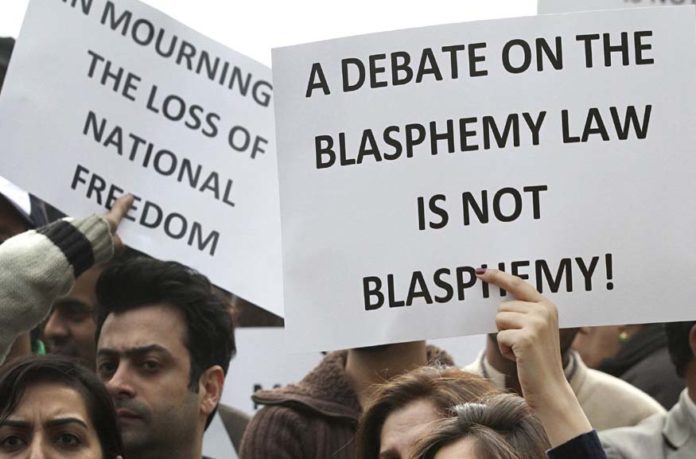Disclaimer: The Eqbal Ahmad Centre for Public Education (EACPE) encourages critical and independent thinking and believes in a free expression of one’s opinion. However, the views expressed in contributed articles are solely those of their respective authors and do not necessarily reflect the position or policy of the EACPE.
Around 4 decades ago, Gen. Zia-ul Haq, a military dictator, ousted Zulfiqar Ali Bhutto and took over the charge. After a controversial trial, Bhutto was sentenced with death penalty in 1979. Zia exploited religious sentiments of public to extend his rule, and started implementing his so called Islamization in the society, and for that purpose he introduced some religious legislations. One of them was the introduction of blasphemy laws which was presented in 1986 through sections 295-B and 295-C of the Pakistan penal code A person convicted under these laws is given death sentence.
As many as 74% of blasphemy cases in Pakistan originate from Punjab.
It is reported that as many as 74% of blasphemy cases in Pakistan originate from Punjab, whereas hundreds of the cases have been registered against the minorities. It’s worth mentioning here that prior to 1986, there was British version of blasphemy laws. It was made a crime to insult religious assembly, making derogatory language about beliefs and intentionally destroying a place of worship. Between 1927, when British colonial rulers made blasphemy a criminal offence, and 1986, only 14 cases were reported in court. Afterward, there has been a surge and since then thousands of cases have been handled. Most of those given the death sentence have overturned their penalties on appeal on the grounds that witnesses and complaints were based on personal or political vendetta (ref: ICP 2015 study on the implementation of blasphemy laws in Pakistan.) This raises many questions regarding the application of such laws and their transparency. Worst is how people take law in their own hands, blame one of blasphemy and act violently as vigilante mob to kill the accused. The recent case of Mashal Khan’s brutal lynching is just one of many unfortunate examples.
Recently, the Supreme Court of Pakistan issued the much anticipated judgment on Asia Bibi, a Christian woman, who was accused of blasphemy charges around a decade ago, and set her free. The court’s decision is so detailed and clear.
The first Information Report (FIR) was registered with suspiciously delay of 5 days. There were over 25 witnesses but only two ladies reported the alleged blasphemous remarks by Asia Bibi. It is to be noted that the said ladies did not appear before the Court to support the prosecution case. Moreover, witnesses in the case gave contradictory statements. Also, complainant was unsure about the date of alleged crime and there were glaring discrepancies regarding FIR and arrest. Furthermore, witnesses were found lying about not fighting with Asia Bibi. The Supreme Court’s judgement condemns the act of extra-judicial confession of Asia Bibi saying: “In this very instant case, the appellant was brought to a gathering of potentially hundreds of people, she was alone at the time, tensions were running high, and it was an intimidating environment, the appellant may well have felt threatened and vulnerable; thus, the alleged extra-judicial confession made by the appellant, even if presumed to have been made by her before such public gathering, cannot be termed as a voluntary action and nor it can be relied upon to form the basis of a conviction, especially for capital punishment.”
Ulemas need to play their responsible role in educating masses to respect the rule of law, and make sure that no innocent is persecuted of false accusations.
Reaction to this clear verdict was disappointing though not unexpected. Some religious leaders from different sects asked their followers to come on roads. The protesters burned cars, vehicles and buses. A huge loss to economy and property, both public and private, occurred. It seems Muslims have lost their way and fair conscience. The holy Prophet (SAW) and the Holy Quran prohibited from causing destruction on the land. He (SAW) told about a reward from Allah even on the removal of painful things from the path, like stones. How are we following our Prophet (SAW) by blocking roads and following mob psychology? Where is the regard for law, where is our compassion and mercy? Have we forgotten that the Holy Prophet (SAW) had forgiven all the people after Fatah-e-Makkah, the ones who had always hurt Him (SAW).
Coming back to Asia Bibi verdict, if the complainant or authentic Ulemas are not satisfied by the court decision, then they should file a review application and challenge the decision. And if the court upholds its decision, then they all should regard and accept it. This is the only right and legal way. Understandably, blasphemy is a serious concern for the Muslims all across the world. However, it doesn’t mean that we keep following our emotions blindly. Ulemas need to play their responsible role in educating masses to respect the rule of law, and make sure that no innocent is persecuted of false accusations and there is no miscarriage of justice.
 The writer, Irfan Khan, is a Researcher of Natural Sciences at Physics Department, Quaid-e-Azam University, Islamabad, Pakistan. He can be reached at ik8828903@gmail.com
The writer, Irfan Khan, is a Researcher of Natural Sciences at Physics Department, Quaid-e-Azam University, Islamabad, Pakistan. He can be reached at ik8828903@gmail.com



 The writer, Irfan Khan, is a Researcher of Natural Sciences at Physics Department, Quaid-e-Azam University, Islamabad, Pakistan. He can be reached at
The writer, Irfan Khan, is a Researcher of Natural Sciences at Physics Department, Quaid-e-Azam University, Islamabad, Pakistan. He can be reached at 




Nice and thought provoking.